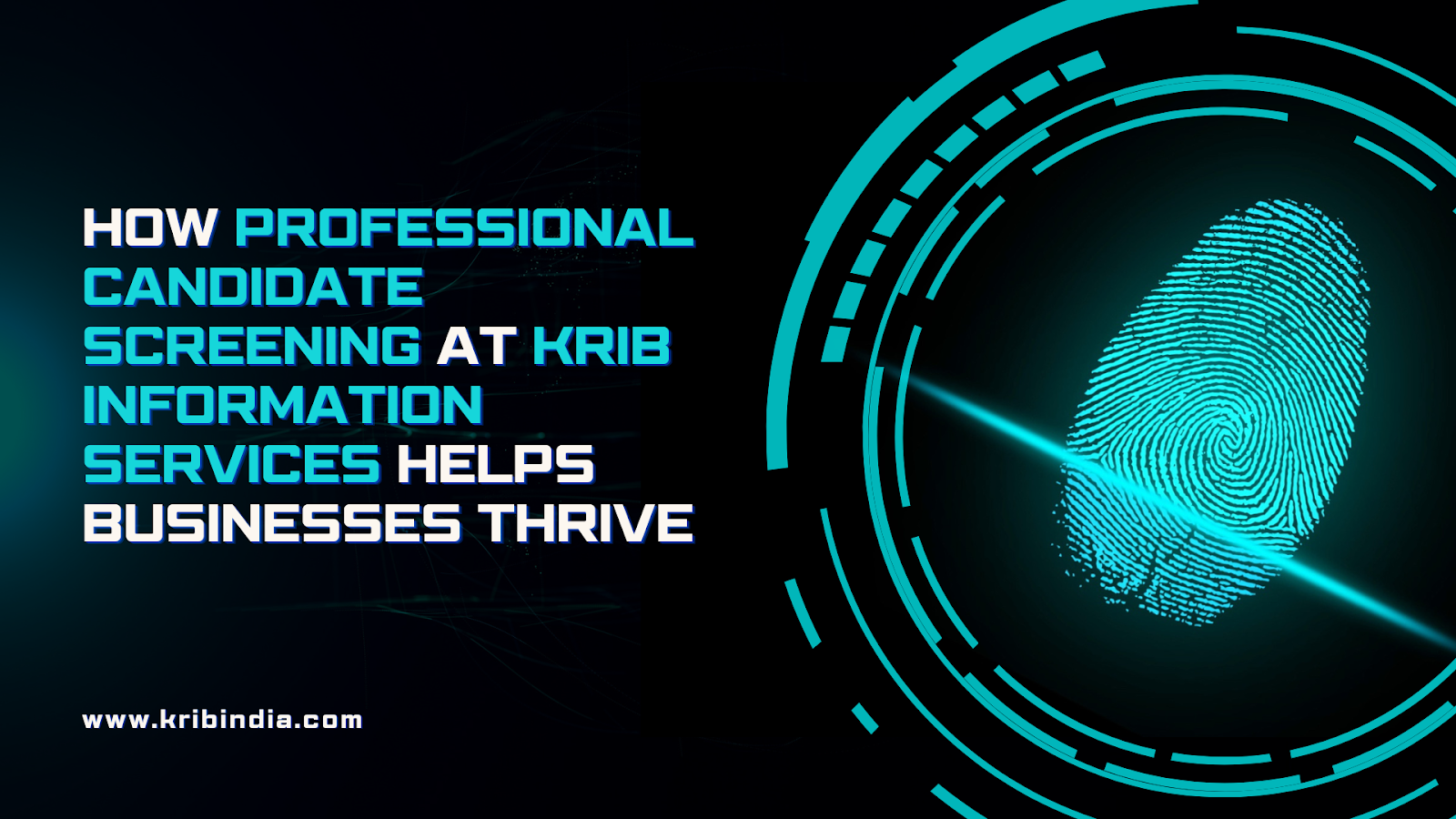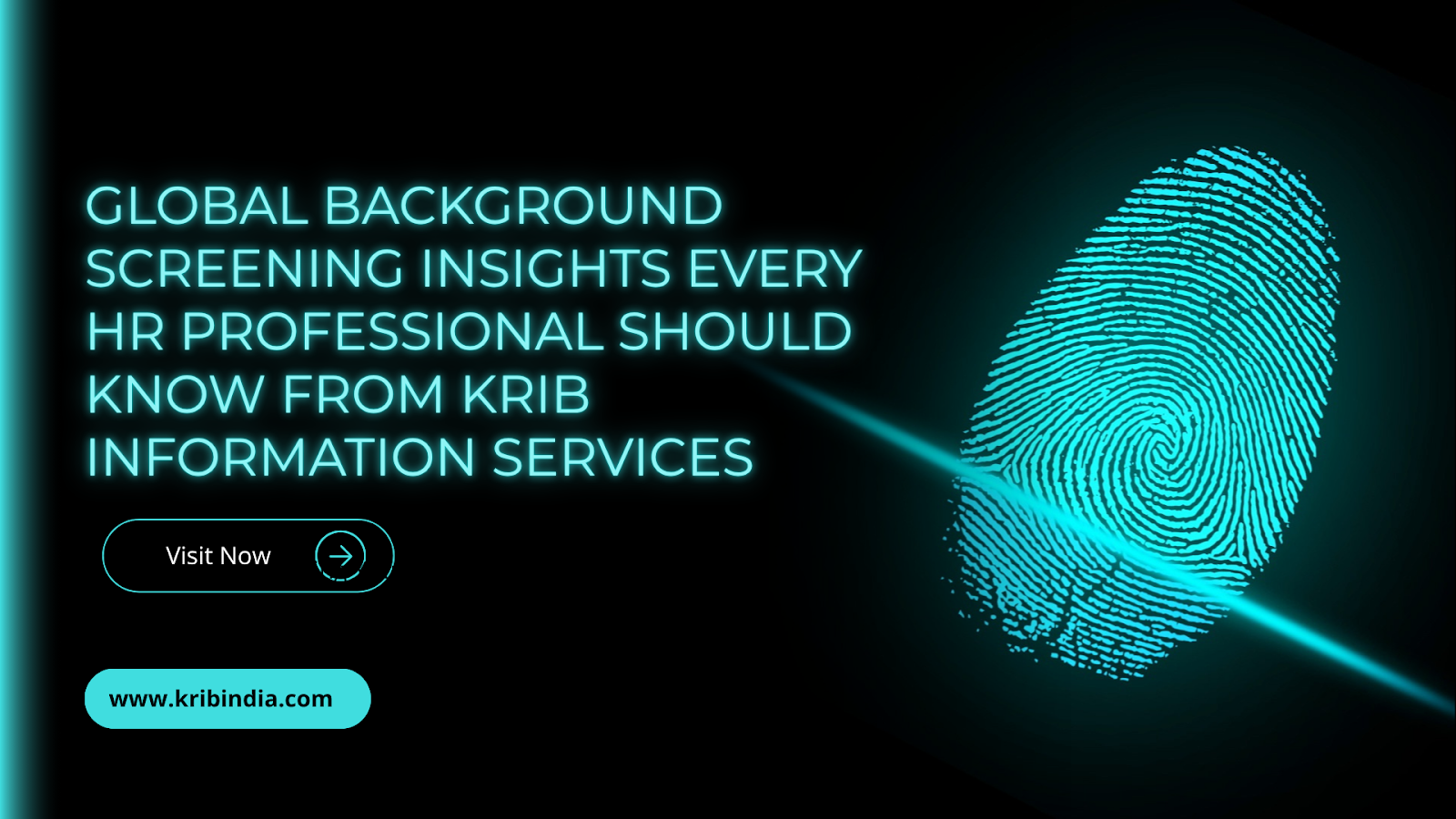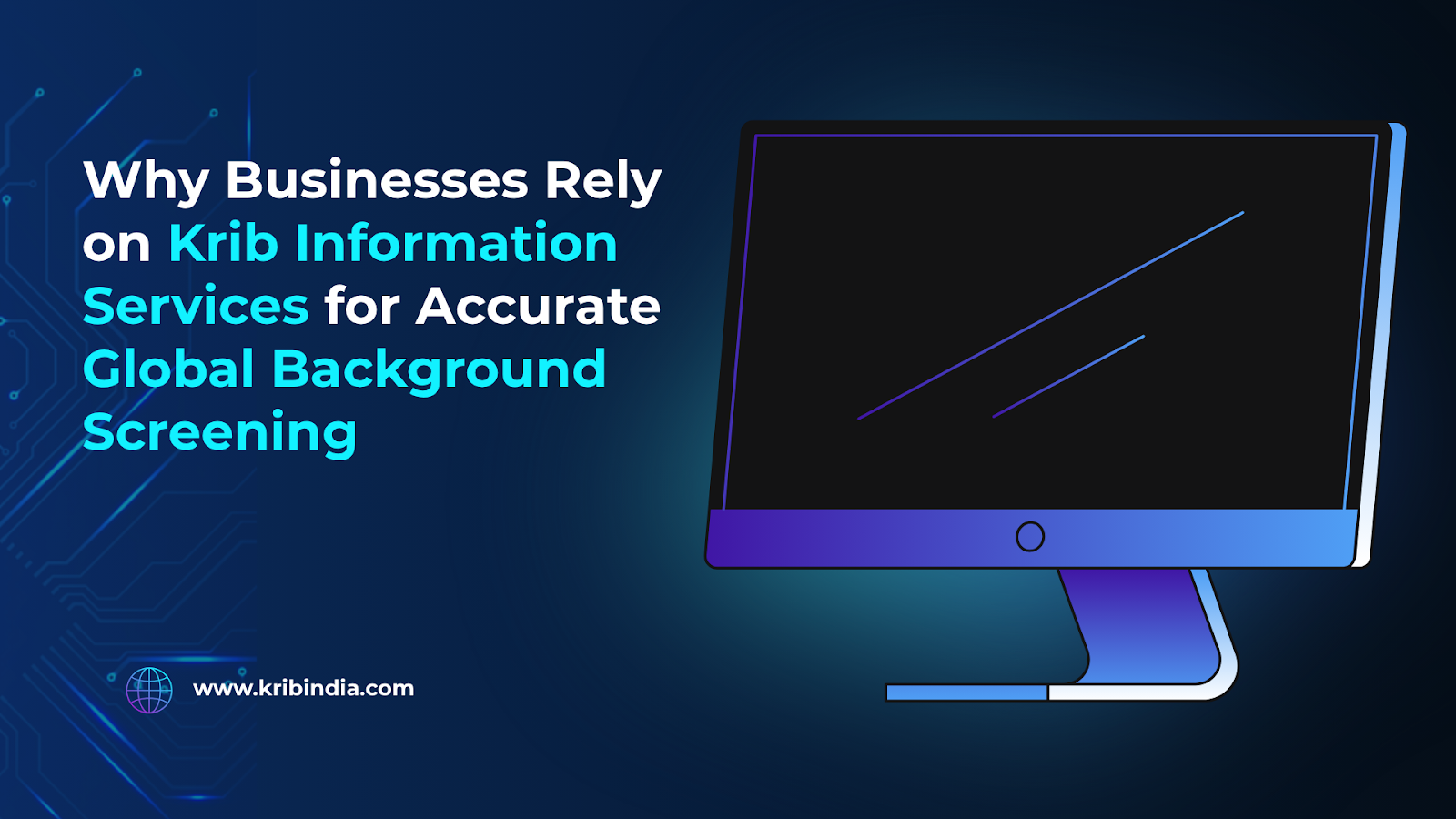In today’s hyper-connected, borderless business environment, hiring talent globally is no longer a niche aspiration — it is a necessity. But with that comes an imperative: how do you ensure that prospective hires from other countries, jurisdictions, or regions are who they claim to be, with credentials, experience, and backgrounds that hold up to scrutiny? That is where Global Background Screening becomes a critical strategic function. And if you are seeking a trusted Background Verification Company, Krib Information Services offers a proven roadmap to implement a robust, compliant, and efficient screening process.
In this guide, we walk you through Krib Information Services’ step-by-step approach to executing effective Global Background Screening — from planning and consent to reporting, risk analysis, and continual improvement.
1. Understanding Why Global Background Screening Matters
Before diving into the steps, it is essential to understand why global background screening is no longer optional but integral to modern hiring:
- Cross-border hiring increases risk: When you recruit across countries, verifying credentials, criminal history, employment history, identity, and address becomes more complex. Databases differ, languages vary, and legal constraints on data access abound.
- Compliance and local laws: Each jurisdiction has its own data privacy, regulatory, and employment laws. A global screening process must remain compliant everywhere.
- Mitigation of reputational & legal liability: Hiring an individual with hidden criminal history, forged credentials, or undisclosed litigation can expose your company to negligent hiring claims, financial loss, or reputational damage.
- Increasing candidate fraud: With remote hiring, some candidates may attempt falsification of degrees, work experience, or identities. A rigorous Global Background Screening mechanism helps detect such discrepancies before onboarding.
- Confidence in your talent decisions: Quality screening empowers HR leaders and hiring managers to make decisions grounded in verifiable facts, even across borders.
Engaging a capable Background Verification Company is not just convenient — it is a strategic necessity.
2. Why Choose Krib Information Services for Global Background Screening
Before mapping out the step-by-step process, here’s why Krib Information Services stands out as a partner for Global Background Screening:
- Specialization in employee screening and verification: Krib Information Services is a leading Background Verification Company in India offering a wide suite of screening and verification services.
- Global coverage: While rooted in India, Krib Information Services has extended its services internationally, making it capable of handling multi-jurisdictional screening requests.
- Compliance and security first: Krib Information Services emphasizes confidentiality, compliance with country, state, and regional rules, and secure handling of candidate data.
- Thorough and methodical approach: The firm follows a steady, methodical, and proven verification approach, combining digital and field methods for maximum accuracy.
- Comprehensive service offerings: Their portfolio includes employment verification, qualification verification, address checks, identity checks, court record checks, credit history, and more.
- Pan-India presence and strong network: With headquarters in Noida and offices across major cities, Krib can manage both domestic and global verification volumes efficiently.
With this foundation, Krib Information Services can lead clients through a structured, reliable Global Background Screening process.
3. Step 1: Project Planning & Scoping
A Global Background Screening engagement begins with clear planning and scoping. Krib Information Services structures this phase as follows:
3.1 Define Roles, Responsibilities & Stakeholders
- Identify who (HR, legal, compliance) will own the screening process.
- Determine internal and external interfaces, escalation paths, and reporting lines.
3.2 Establish Geographic & Jurisdictional Scope
- Map out which countries or jurisdictions require checks.
- Identify which verifications are legally permitted or restricted in each territory.
- Align scope with risk tolerance and role sensitivity.
3.3 Define Screening Modules
- Decide which checks will be mandatory: identity, criminal record, employment, education, address, references, or credit checks.
- For global candidates, some modules need localization for accuracy.
3.4 Candidate Consent & Disclosures
- Ensure candidate consent forms comply with local privacy and data laws.
- Inform candidates explicitly that Global Background Screening will be performed.
- Include data use, retention, and rights in disclosures.
3.5 Design Process Flow, Timelines & SLAs
- Map the end-to-end process flow: from data submission to reporting.
- Set clear turnaround times and service level agreements.
3.6 Integration & Technology
- Integrate screening with applicant tracking or HR systems.
- Securely exchange data through encrypted channels.
This planning phase creates the operational blueprint for the Background Verification Company and the client.
4. Step 2: Candidate Data Capture & Consent
Once planning is done, the next step is collecting candidate data and consent — a crucial part of Global Background Screening.
4.1 Candidate Profile Capture
Gather full candidate details such as name, date of birth, national ID, addresses, education, and employment history. Structured input forms minimize errors.
4.2 Distribute Consent & Disclosure Documents
Provide candidates with consent and disclosure forms explaining the process, checks, and their rights. Keep detailed records of consent for audit purposes.
4.3 Verify Preliminary Identity
Conduct early identity verification to confirm basic information before deeper checks begin. This step prevents unnecessary delays and false starts.
5. Step 3: Execution of Verification Modules
This is the core of Global Background Screening. Krib Information Services divides it into specialized verification modules.
5.1 Identity Check
Validate the candidate’s identity using government records, IDs, or passports. Check for aliases, mismatched addresses, and document authenticity.
5.2 Qualification / Education Verification
Contact schools, colleges, or universities to verify degrees, attendance, and marksheets. In global cases, Krib collaborates with local verifiers or official databases.
5.3 Employment Verification
Reach out to past employers to confirm tenure, designation, responsibilities, and reasons for leaving. Krib ensures authentic communication and evidence-backed reports.
5.4 Address Verification
Confirm current and permanent addresses via utility records, postal data, or physical visits. In India, Krib conducts field visits through its on-ground teams.
5.5 Criminal / Court Record Check
Search national and local court records, criminal databases, and police records for any legal history. For global checks, Krib collaborates with partners in respective jurisdictions.
5.6 Credit History / Financial Check
For finance or compliance roles, assess creditworthiness and identify financial irregularities in line with legal permissions.
5.7 Reference / Professional Check
Engage candidate references to assess integrity, performance, and reliability. Structured questionnaires help detect inconsistencies.
5.8 Candidate Information / Watchlist Screening
Check for the candidate’s presence on global watchlists, sanctions databases, or politically exposed persons (PEP) lists.
5.9 Exception Handling
When discrepancies arise, Krib re-verifies data, contacts relevant institutions, and resolves exceptions before final reporting.
Krib Information Services ensures each module combines accuracy, speed, and legal compliance.
6. Step 4: Quality Review, Audit & Reporting
Once verifications are complete, Krib Information Services emphasizes accuracy and transparency.
6.1 Multi-Level Quality Checks
Reports undergo internal audits and validation for consistency and accuracy before delivery.
6.2 Standardized Reporting Framework
Krib provides concise reports with status indicators (clear, discrepancy, or critical), detailed findings, and recommendations.
6.3 Secure Delivery
Reports are shared through secure portals or encrypted formats to maintain confidentiality.
6.4 Audit Trail & Logs
Every step — from data receipt to report generation — is logged for compliance and accountability.
7. Step 5: Decisioning Support & Risk Analysis
The next stage of Global Background Screening involves interpreting findings and guiding hiring decisions.
7.1 Risk Scoring
Each report is categorized based on severity — low, medium, or high risk — helping employers make quick decisions.
7.2 Candidate Feedback
If discrepancies appear, candidates are allowed to respond or clarify with supporting documents.
7.3 Decision Consultation
Krib supports HR and compliance teams by explaining findings and providing risk management recommendations.
7.4 Record Retention
Define data retention policies and set periodic re-verification intervals for ongoing compliance.
8. Step 6: Continuous Improvement & Scaling
A great Background Verification Company like Krib Information Services believes in continuous enhancement.
8.1 Post-Implementation Review
Assess efficiency, turnaround time, and feedback from clients to improve workflows.
8.2 Data Analytics
Analyze red-flag trends by geography, department, or job type to enhance risk management.
8.3 Local Partnerships
Expand and train international partners for faster and more accurate verifications.
8.4 Technology Upgrades
Implement AI-based verification tools and maintain secure, automated data flows.
8.5 Legal & Compliance Updates
Monitor changes in privacy laws and update screening protocols accordingly.
8.6 Feedback Loop
Gather client feedback to refine dashboards, reporting formats, and candidate experience.
Through continuous optimization, Krib Information Services ensures its Global Background Screening solutions remain accurate, scalable, and compliant.
9. Best Practices for Effective Global Background Screening
From extensive industry experience, Krib Information Services recommends these best practices:
- Start verifications early to manage delays in certain countries.
- Localize every step for compliance with regional laws.
- Verify data through multiple independent sources.
- Communicate transparently with candidates.
- Focus equally on speed and accuracy.
- Tailor screening depth to role criticality.
- Maintain compliance oversight at all times.
- Periodically audit verification partners.
- Keep reports concise and decision-focused.
- Invest in training, technology, and data protection.
These practices help organizations reduce hiring risks and strengthen global trust.
10. Example of a Global Background Screening Flow
Here’s an example of how Krib Information Services handles multi-country screening:
- Planning: Define required checks for all jurisdictions involved.
- Data & Consent: Collect candidate details and consent documents.
- Identity Verification: Validate national IDs or passports in each country.
- Education & Employment Verification: Verify with institutions and previous employers globally.
- Criminal / Court Check: Perform local and international record searches.
- Address Verification: Use physical and database checks.
- Credit Check: Conduct financial screening if legally permissible.
- Watchlist Check: Screen for global sanctions or PEP listings.
- Quality Review: Conduct multi-layer quality control before report release.
- Decision & Retention: Share report securely and store for audit reference.
This comprehensive process ensures both accuracy and compliance.
About Krib Information Services
Krib Information Services is one of India’s leading Background Verification Company and Business Process Management providers, specializing in employee background screening and verification services.
Headquartered in Noida with a nationwide network of professionals, Krib Information Services delivers both domestic and Global Background Screening solutions tailored to diverse industry needs.
Its comprehensive suite includes:
- Qualification / Education Verification
- Employment Verification
- Identity Verification
- Address Verification
- Court and Criminal Record Check
- Credit and Financial History Check
- Candidate Information and Watchlist Screening
With its commitment to accuracy, confidentiality, and compliance, Krib Information Services helps organizations mitigate hiring risks, strengthen workforce integrity, and ensure global compliance.







